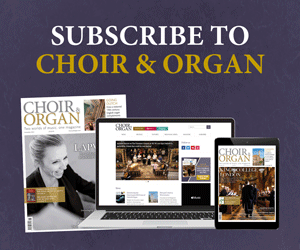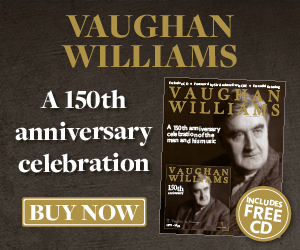Hugo Bell - Hermitage
Thursday, May 9, 2024
Setting aside Western poetry in favour of a Tang-Dynasty text has taken composer Hugo Bell in a new musical direction. He talks to Matthew Power

Credit: David Holbrook
The score is available for free download until 30 November 2024.
A decade ago, Hugo Bell graduated with a music degree from Newcastle University, during which time he studied organ and conducting at Gothenburg Academy of Music for a year. A Master’s degree at the Royal Birmingham Conservatoire (RBC) followed, then with support from the Leverhulme Foundation and Mendelssohn Scholarship Foundation at the Royal Conservatory of The Hague. Have there been key tutors that influenced him?
‘Before going to RBC, I studied privately with James Weeks (director of Exaudi, and a brilliant composer in his own right). In the Hague, my teacher Peter Adriaansz was a big influence. At Birmingham there was Howard Skempton, known for the simplicity in his music, and such an interesting teacher because of his early involvement with experimental composers including Cornelius Cardew. Howard used to say that composition is an act of distillation; a process of removal rather than addition.’ Around this time Bell attended a course run by Benslow Music and met composer Michael Finnissy. ‘I knew that he wrote fiercely difficult music, yet my first lesson with him was not what I expected. He is incredibly intelligent, but also very compassionate and understanding.’
We talk about some specific pieces I’ve listened to. The Path Contorts As The Traces Fade (2020) for hyperorgan. (As well as the hyperorgan at the Orgelpark, Amsterdam, iterations of this experimental instrument have sprung up this year in Germany and the USA.) The piece espouses an entirely new way to play and hear a pipe organ; its repetitive sequences are akin to some minimalist music but the control available enables the acoustic instrument to transform, creating a sound-world of texture and pulse, morphing in real time as the player follows the directions in the score. It creates an acoustic effect which resembles the sounds of a gigantic engine throbbing away, at once compelling, hypnotic and inimical… What did Bell learn from writing this piece and revising it for further performances?
‘I could talk for days about the hyperorgan! It works on exactly the same principle as any pipe organ, except the solenoids and electromagnets which cause the pallets to open are able to be mapped digitally to any pipe and controlled through the console to open and close at any speed in any sequence. This takes the organ to the other end of the spectrum, where you’re no longer limited by having just two arms and legs. You have control over every single pipe and stop, and everything can be routed anywhere. This still acoustic instrument becomes a kind of cyborg!’
Suspended Animation I (2018) for chamber ensemble and his orchestral piece Weven (2019) both possess a delicate sense of timbre between instruments and a layering and legato which draws the listener in closer. Both are musical languages which might conventionally be described as ‘beautiful’. How relevant or necessary is aural beauty in contemporary music and, if it is absent, what replaces it in giving the listener a sense of satisfaction?
‘I think going back to Arvo Pärt is a good example. When I asked James Weeks about Pärt’s music, he suggested that his language was a kind of white-note serialism. You listen to Fratres or Credo and you hear these melancholic, juicy sounding vertical harmonies, and think how beautiful they are. But if you reframe it under the understanding that the piece has been composed according to a strict mathematical principle, the climaxes are entirely incidental: just byproducts of this numerical structure. I think it’s a question of subjectivity, to some extent. Music that will make my mum cry would make me vomit! I’m constantly asked by my parents, “Why aren’t you writing pretty tunes anymore?” If I listen back to that same music, I cringe a little because it seems so facile.’
Turning to Hermitage, Bell’s New Music piece for double choir, he has chosen an ancient Chinese poem from the Tang Dynasty and made a virtue out of its linguistic challenges. What drew him to this text?
‘I hadn’t written a choral piece since 2016, so I was returning to the genre with a different perspective. I always tend to set poetry and I found that what used to interest me – John Donne’s metaphysical poems for instance – didn’t any more. It seemed that poetry from the 15th and 16th centuries is full of melodrama, egocentricity – “blasted with sighs, and surrounded with tears” – and I thought, ok, we don’t need another love song.’ Searching took Bell through Platonic-era philosophy, German theologians, then non-European and non-Western texts; finding an anthology of Tang-Dynasty poems, he spent several weeks dissecting every one. ‘I stumbled across this poem by Wang Wai: even the translation of the title is dubious; commonly known as Deer Park, it’s a very short, simple poem, but there are so many things that jumped out at me.’ There is an absence of the first person in Chinese poetry, so it isn’t clear who is saying what to whom, creating a vaguer sense of impression. The rhyming structure reflects the era in which it was written; and there is a visual element to the arrangement of the text. Additionally, there are 30-40 translations of this poem, all different. Bell constructed several variants with the help of a friend who can speak Chinese.
Looking at the ‘overview of parts’, in effect an approximation of a full score, we can see that there are no contrived moments of cadence or symmetry and that each performance will be slightly different through how the parts coalesce. That will surely breathe new life into the piece each time… How did Bell go about ‘hearing’ the whole in his mind’s ear as he composed it?
‘Funnily enough this is probably the sixth piece I’ve written which has this temporal ambiguity, so I’ve gained an inkling of what works and what doesn’t. We always take metre, synchronisation, rubato for granted. Once you start pulling at the edges of that, everything falls apart immediately. It’s fascinating. This idea of it being this living organism that I’m ceding control of is something which is more motivating. But I’m not going to the aleatoric extremes that Stockhausen did. In Hermitage, harmony becomes the most important thing once rhythm is taken away. So the harmonic construction of the piece is a driving factor in how it works – harmony as a liminal and transitive element of music; harmony that is not functional, gravitating towards or away from a tonal centre, but which still gives the piece a semblance of tonality. Much of this is based around circles of fifths.’
He has provided a clear and helpful commentary for performers and (optional) directors to follow. For singers who are not used to reading from individual vocal parts, does he have any tips for getting used to the perhaps unsettling sense of not being able to see what your fellow singers are doing?
‘As a singer myself, I always say, trust your pitching and your muscle memory. I know what a top G feels like physically in my body. Because in most choral music there are always points of reference (whether it’s an accompaniment or getting a note from a previous entry), here that point of reference has changed and it’ll likely take a few tries to get used to it. It’ll feel a bit like cycling without stabilisers for the first time! Because of how I’ve constructed the harmony, there are no points at which you’re completely isolated, so take a leap of faith.’
Download the score
The score for Hermitage, commissioned by Choir & Organ in partnership with The Marian Consort, is available to download and perform until 30 November 2024.
Sign in below, or register a free account, to download the score:
Download Now











